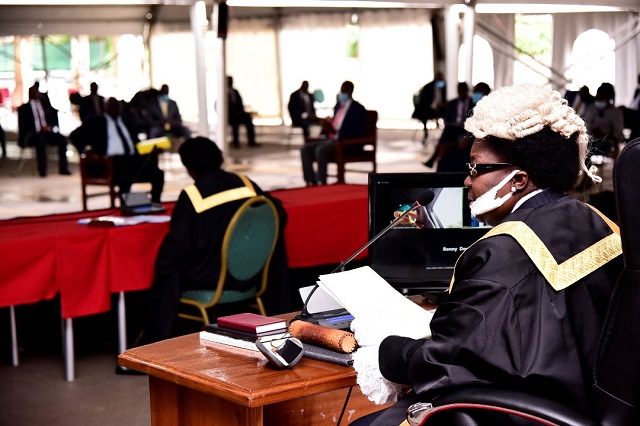
Kampala, Uganda | THE INDEPENDENT | The COVID-19 pandemic helped the Parliament to overcome quorum crisis that had dogged the legislative processes.
Deputy Speaker of Parliament, Jacob Oulanyah says while the COVID-19 crisis has had devastating effects on the lives of Ugandans, it has provided opportunity for Parliament to review its procedure.
He says with fewer number of MPs, the Parliament was able to perform much more in terms of bills, motions and resolutions adopted.
Oulanyah says the change in the rules of procedure in Parliament following the COVID-19 pandemic has eased business in terms of passing bills and the adoption of the motions.
Oulanyah was the guest speaker at a Castle Think Tank Dialogue on the effect of COVID-19 on the legislature. Speaking at the Dialogue today, he says now that it is easier to conduct the business of parliament without adhering to the quorum requirement, may be Parliament should review the rules to reduce on the numbers.
Rule 23(1) of the Rules of Procedure of Parliament says one third (137 MPS) of all members of Parliament are entitled to vote to be present in Parliament before a bill is passed into law.
With the COVID-19 restrictions related to social distancing, the Parliamentary Commission decided to reduce the numbers to about one hundred out of over 450 members of Parliament.
The rules of Parliament were also amended to provide for MPs to attend Parliament virtually through technologies like Zoom instead of being physically in parliament.
With the reduced numbers, MPs were able to adopt the 2020/2021 budget. The MPs also approved a motion for the creation of new cities of Arua, Gulu, Jinja, Mbarara and Fort Portal, Mbale, Masaka, Hoima, Entebbe, Lira, and Soroti. The motion on the cities had been in Parliament since late 2019.
The suggestion by the Speaker on review of the quorum requirement renews old debate about quorum in parliament.
The quorum requirement sparked off debate in July 1999 when the Democratic Party leaders, Paul Kawanga Ssemogerere and Zachary Olum petitioned the constitutional court challenging the validity of the Referendum and other Provisions Act arguing that it was not validly passed by Parliament because of lack of quorum as prescribed by Article 88 of the Constitution.
While Oulanyah is in upbeat mood about the performance of Parliament amidst the COVID-19 pandemic, the Associate Director of the Great Lakes Institute for Strategic Studies (GLISS), Godbar Tumushabe says Parliament surrendered its functions to the executive.
Tumushabe says a lot of the COVID-19 interventions by the Executive were implemented without the oversight of Parliament.
He says the absence or minimal check by Parliament on the executive during the COVID-19 has rendered citizens hostage to the excesses of the Executive. The Deputy Speaker however admits that the COVID-19 restriction have substantially affected the way parliament conducts public hearings.
Some of the participants at the Think Tank suggested that since Parliament can conduct its business without huge numbers is testimony about the need to reduce the number of members of parliament for effective legislation.
******
URN
 The Independent Uganda: You get the Truth we Pay the Price
The Independent Uganda: You get the Truth we Pay the Price



